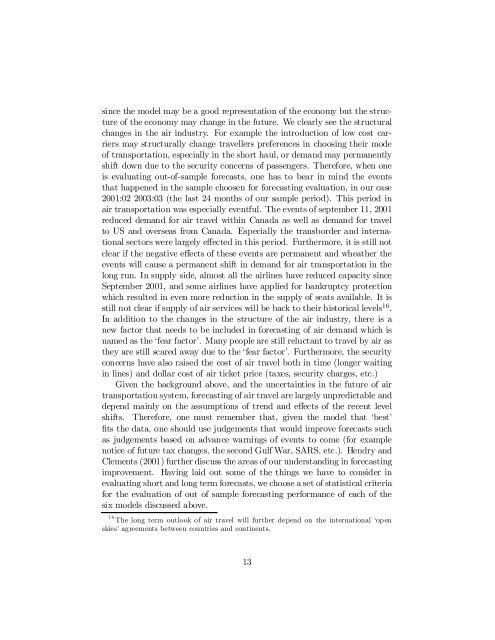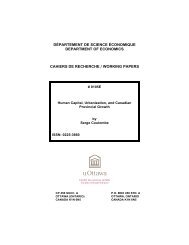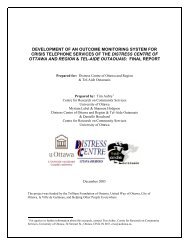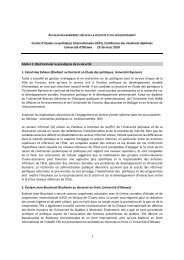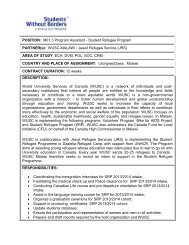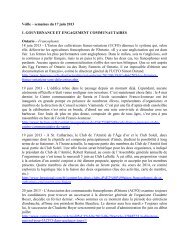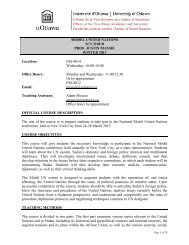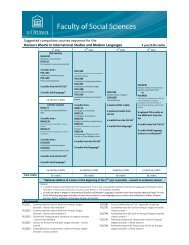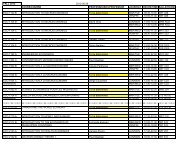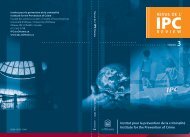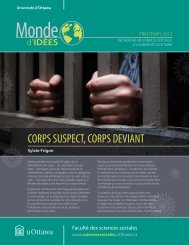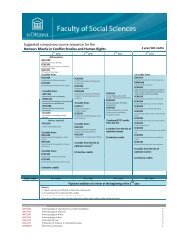0306E - Faculty of Social Sciences - Université d'Ottawa
0306E - Faculty of Social Sciences - Université d'Ottawa
0306E - Faculty of Social Sciences - Université d'Ottawa
You also want an ePaper? Increase the reach of your titles
YUMPU automatically turns print PDFs into web optimized ePapers that Google loves.
since the model may be a good representation <strong>of</strong> the economy but the structure<br />
<strong>of</strong> the economy may change in the future. We clearly see the structural<br />
changes in the air industry. For example the introduction <strong>of</strong> low cost carriers<br />
may structurally change travellers preferences in choosing their mode<br />
<strong>of</strong> transportation, especially in the short haul, or demand may permanently<br />
shift down due to the security concerns <strong>of</strong> passengers. Therefore, when one<br />
is evaluating out-<strong>of</strong>-sample forecasts, one has to bear in mind the events<br />
that happened in the sample choosen for forecasting evaluation, in our case<br />
2001:02 2003:03 (the last 24 months <strong>of</strong> our sample period). This period in<br />
air transportation was especially eventful. The events <strong>of</strong> september 11, 2001<br />
reduced demand for air travel within Canada as well as demand for travel<br />
to US and overseas from Canada. Especially the transborder and international<br />
sectors were largely e¤ected in this period. Furthermore, it is still not<br />
clear if the negative e¤ects <strong>of</strong> these events are permanent and wheather the<br />
events will cause a permanent shift in demand for air transportation in the<br />
long run. In supply side, almost all the airlines have reduced capacity since<br />
September 2001, and some airlines have applied for bankruptcy protection<br />
which resulted in even more reduction in the supply <strong>of</strong> seats available. It is<br />
still not clear if supply <strong>of</strong> air services will be back to their historical levels 16 .<br />
In addition to the changes in the structure <strong>of</strong> the air industry, there is a<br />
new factor that needs to be included in forecasting <strong>of</strong> air demand which is<br />
named as the ‘fear factor’. Many people are still reluctant to travel by air as<br />
they are still scared away due to the ‘fear factor’. Furthermore, the security<br />
concerns have also raised the cost <strong>of</strong> air travel both in time (longer waiting<br />
in lines) and dollar cost <strong>of</strong> air ticket price (taxes, security charges, etc.)<br />
Given the background above, and the uncertainties in the future <strong>of</strong> air<br />
transportation system, forecasting <strong>of</strong> air travel are largely unpredictable and<br />
depend mainly on the assumptions <strong>of</strong> trend and e¤ects <strong>of</strong> the recent level<br />
shifts. Therefore, one must remember that, given the model that ‘best’<br />
…ts the data, one should use judgements that would improve forecasts such<br />
as judgements based on advance warnings <strong>of</strong> events to come (for example<br />
notice <strong>of</strong> future tax changes, the second Gulf War, SARS, etc.). Hendry and<br />
Clements (2001) further discuss the areas <strong>of</strong> our understanding in forecasting<br />
improvement. Having laid out some <strong>of</strong> the things we have to consider in<br />
evaluating short and long term forecasts, we choose a set <strong>of</strong> statistical criteria<br />
for the evaluation <strong>of</strong> out <strong>of</strong> sample forecasting performance <strong>of</strong> each <strong>of</strong> the<br />
six models discussed above.<br />
16 The long term outlook <strong>of</strong> air travel will further depend on the international ‘open<br />
skies’ agreements between countries and continents.<br />
13


